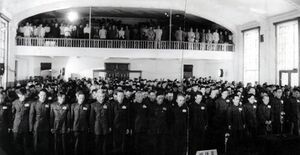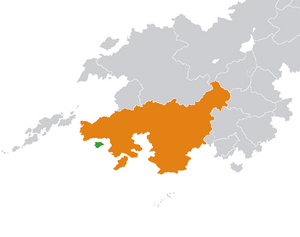Shangean unionism
| Shangean unionism | |||||||||||||||
|---|---|---|---|---|---|---|---|---|---|---|---|---|---|---|---|
| Simplified script | 晓东联合主义 | ||||||||||||||
| Traditional script | 曉東聯合主義 | ||||||||||||||
| |||||||||||||||
| Abbreviation | |||||||||||||||
| Simplified script | 晓联 | ||||||||||||||
| Traditional script | 曉聯 | ||||||||||||||
| |||||||||||||||
Shangean unionism (Shangean: 曉東聯合主義, Morwall romanization: hiu2 dung1 lyun4 hap6 jyu2 yi6), is a political movement which favours the integration of Nakong into Shangea and supports the promotion of Shangean culture within Nakong. Supporters of unionism hold the view that Nakong is properly part of the Shangean cultural sphere and that the Nakongese and Shangeans are one people who should form a single nation-state. Unionists also typically support the use and teaching of Putonghua within Nakong, either alongside or replacing Paisha, and oppose the Nakongese government's alignment with Senria, Estmere and the Euclean Community. As a result, Shangean unionism is often described as a manifestation of Shangean chauvinism or irredentism.
Nakong was settled by Shangeans fleeing the turmoil of the Four Kingdoms era in the 6th century CE and became part of the Jiao dynasty in 1402. It would remain part of the Shangean Empire until 1833, when the Embro–Shangean War resulted in the island being ceded to Estmere as a colony. From the mid-19th century onward, anti-colonial Nakongese intellectuals began to call for an end to Estmerish rule and reunification with Shangea. During the Great War, Nakong was jointly occupied by Gaullica and Imperial Shangea, with many anti-colonial unionists being appointed to roles in the collaborationist regime. After the liberation of Nakong, collaborationist officials were largely acquitted in jury trials and Shangean unionism continued to gain in strength, resulting in the formation of the All-Nakong Unionist League in 1953 to advocate for reunification in the leadup to the independence of Nakong.
While the movement never commanded majority support in the Nakongese population, its popularity endured among intelligentsia and the urban working class and caused severe unrest following independence in 1958 in Nakong's cities, particularly Ningcho and Patlin. Following deadly riots at the National University of Nakong and a failed insurrection in Patlin following disputed local elections, the Self-Determination Congress-led Nakongese government cracked down on unionism and prosecuted dozens of alleged movement leaders in the Patlin trials of 1962, which were marred by allegations of prosecutorial misconduct and judicial partiality. Subsequently, the Parliament of Nakong enacted the Internal Security Act 1963, which criminalized support for Shangean unionism as treason, forcing the movement underground and triggering the East Nakong insurgency. The persecution of the unionists inflamed tensions with Shangea, which responded with military confrontation during the Coastal Crisis. Shangean unionism as a major political force collapsed after the armed insurgency fell dormant in the 1980s.
Today, Shangean unionism is considered a fringe and extremist movement in Nakong and faces persecution by national authorities. Conversely, it continues to enjoy strong support in Shangea; though the government does not currently claim sovereignty over Nakong, public opinion favours reintegration of Nakong.
History

Prohibition and modern developments

